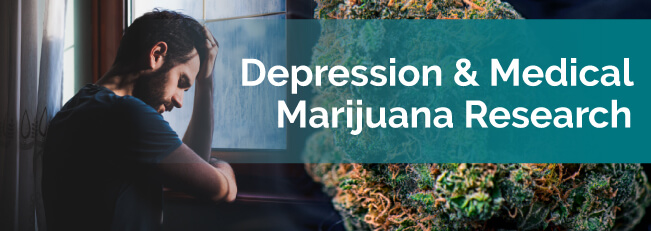
Depression is the number one cause of disability all over the world. It causes you to experience extreme sadness, low self-esteem and a lack of interest in things you used to love. When your outlook on life is dampened, it’s difficult to do everyday tasks.
Increasingly, more depression patients use marijuana for their symptoms. Let’s check out the current research on the topic.
When used under the supervision of a mental health professional, cannabis can act as an effective treatment for your depression symptoms. Many folks think marijuana causes depression, but medical experts believe that the depression came first — not the weed use. In fact, cannabis medicine relieves depression symptoms in patients with chronic illnesses.
Kelly Sagar et al. sought to discover how weed use affects the symptoms of bipolar disorder. A major symptom of bipolar is depression, which occurs during depressive episodes. Since both marijuana and bipolar disorder can change cognitive function and mood, they wanted to understand how they worked both separately and together.
They recruited bipolar patients who smoke marijuana, bipolar patients who don’t smoke it, marijuana smokers without bipolar disorder and a healthy control group. Every patient completed neurological assessments, daily self-reports and weekly visits to the clinic. When the subjects completed their daily self-reports, they entered information about their mood into a small digital device.
After crunching the numbers, they discovered marijuana significantly decreased the bipolar users’ symptoms, and that they felt less depressed after their cannabis use. Also, the marijuana users without bipolar and the control group showed similar mood levels throughout the study, indicating weed didn’t cause depression in the users.
A team of Japanese researchers led by Masahiro Matsunaga aimed to investigate the connection between the cannabinoid receptors in our brains and our moods. Since previous evidence pointed to the cannabinoid receptor in the brain, CB1, reacting to positive stimuli, they wanted to see how it worked genetically. Specifically, they planned to compare two CB1 genotypes that had different sensitivities to cannabinoids.
They accepted almost 200 college students as study participants. At the beginning of the study, the team examined the students’ DNA to determine what kind of CB1 gene each student had. Then, they put the students through a variety of tests, including brain scans and questionnaires.
Students who had the CB1 gene that allowed for more cannabinoid sensitivity experienced more happiness than the students with the less sensitive gene. Since the CB1 receptor takes in cannabinoids from sources like marijuana, this means that brains that easily take in cannabinoids also produce more happiness. While marijuana itself was not involved in this study, it suggests we can use it to elevate a patient’s mood.
Matthew Hill et al. wanted to investigate the link between the endocannabinoid system and depression. Preclinical research indicated the endocannabinoid system could help treat depression. So, they examined the endocannabinoid levels in patients with clinical depression.
To explore this topic, they analyzed the endocannabinoids in blood serum taken from female patients. Half of their research subjects had clinical depression, while the other half did not to serve as a control group. After screening each patient in detail about their psychiatric profile, the researchers drew blood from them and isolated the serum in the blood.
According to the data that Hill and his colleagues collected, there was a significant correlation between endocannabinoid levels in a patient’s blood and the severity of their depression. The subjects who had clinical depression had a much lower number of endocannabinoids in their serum than the participants without depression. This indicates that cannabinoids are an essential part of maintaining a healthy mood.
If you or a loved one has depression and would like to try using cannabis to relieve symptoms, we can lend a hand. Our guide to major depression teaches you everything you need to know about the disorder and how medical marijuana can help. You can also ask a medical marijuana certified doctor in your area.